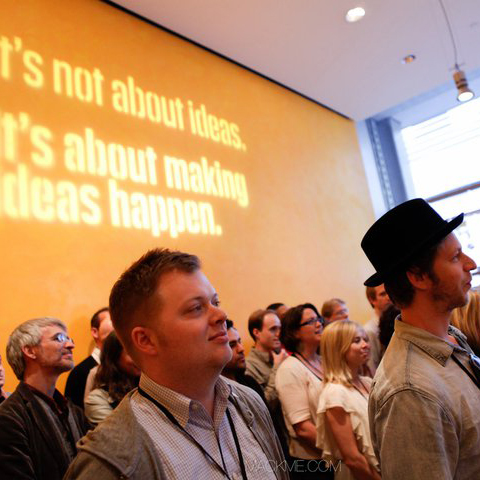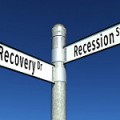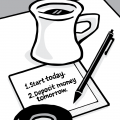Redefining Risk: On Disasters, Pre-Mortems, and Making Ideas Happen

I recently had the chance to participate in the 99% Conference, a gathering of creative professionals produced by Behance.
The team put on a great show at the Times Center in New York, and my (small) part was to conduct a 90-minute “master class” on the topic of Redefining Risk: Increasing Confidence in Your Unconventional Career.
We began the class by looking at two traditional narratives of risk and career:
Narrative #1: Life is dangerous! Working for yourself is a risky, uncertain proposition. Better to take the safe road and work for a larger company.
Almost every entrepreneur or self-employed person hears this narrative when heading out on their own, especially from well-meaning friends or family members. I heard from a woman last week who has built a million-dollar company with more than ten employees, and her family still tells her she should try to find a job “to be safe.”
Narrative #2: Leap and the net will appear! You can do it. If you don’t want to work completely on your own, something is wrong with you or you’re afraid of change.
This narrative is also problematic. Not everyone wants to be an entrepreneur, but almost everyone wants to create freedom and independence. Sometimes we leap, and no net appears.
Entrepreneurs and creatives tend to be regarded as risk-takers. But what if there’s a third way between the undesirable choice of two all-or-nothing options? What about those of us who know better—we know that creating independence for ourselves is the right path, but we don’t necessarily have an aggressive mindset? We know that the cautious person doesn’t always win the race, so how can we avoid being left behind?
Our group in the Times Center lobby began with a risk-o-meter where we looked at how we view the roles of risk and uncertainty in our careers, based on questions like these:
“Working for myself is the only option. I never want to work a ‘real job’ again.”
“It’s better to do one thing very well than to be a jack of all trades.”
“I’d rather have less money and more freedom.”
***
The main part of our time together was focused on a pre-mortem. I stole the idea for the pre-mortem from a fun book on facilitation exercises. (Whenever you have no idea how to lead a 90-minute workshop, it helps to learn what other people have done.)
A pre-mortem is like a debriefing—where you meet to reflect on a recent project or experience—but conducted in advance. With a pre-mortem, you look ahead to a project or experience and identify everything that could go wrong. It helps to raise the stakes by asking, “How will this end in disaster?”
The goal is to find the problems in an upcoming scenario before they happen. In this case, we were looking at concerns related to independent careers. Many of the problems raised related to finances. Others related to a changing marketplace, and still others related to inertia, or concerns about our own ability to produce.
After spending a good length of time thinking about problems and disasters, the next step is to move to premptive action phase. In this phase, you identify which problems are the most pressing and also the most likely to be resolved through a change of course. For example, one group identified “the world will come to an end” as a potential disaster, and another group identified an earthquake. Those would indeed be serious problems, but there’s not much that most of us can do to prepare for either of them.
After we identify the pressing and actionable issues, we then focus on solutions. If we’re worried about money, we can establish an emergency fund. We can also establish a “fun fund”—in my case, I started a fun fund for my travel expenses a couple years ago, and it’s made a big difference in mentality. Even though I have no more or less money in my cumulative bank accounts, having the travel money in an account on its own has helped me feel more secure.
If we’re worried about a changing marketplace, we can create an opportunity list. An opportunity list is an idea list of opportunities we could pursue if we needed to generate more income. (My list is five pages long—I don’t have time to pursue most of the ideas now, but they are there if I need them.)
If we’re worried about inertia, we can use a carrot-and-stick approach: over here, I’m busy writing a manuscript for the AONC book sequel, and as soon as the first draft is complete, I’ll buy a Round-the-World plane ticket. Having the “carrot” in front of me keeps me focused, even though there’s no practical need to wait until the manuscript is finished before getting the ticket.
Your solutions may be different from these, but the goal is to increase confidence. Often, we’re worried about vague concerns and problems. This exercise forces us to bring the real problems to the surface, and then get serious about preventing them from actually taking place.
World Domination Summit Pre-Mortem
The day before heading to New York for this conference, I met with our World Domination Action Team to talk about the upcoming summit. This exercise was very helpful in identifying concerns. With less than 30 days to go until 500 people descend on Portland, what are we most worried about? Where can we take preemptive action to avoid disaster?
We talked through everything that could go wrong: a heat wave will strike Portland, causing an important ice sculpture to melt. Bottlenecks at registration will hinder attendees from a good opening experience. A speaker or VIP guest will have an emergency and cancel at the last minute. Hammocks will fall from the ceiling (long story).
We then thought about which concerns were the most important and what we could do to preempt (or at least mitigate!) disaster well in advance. Over the next half-hour, we created a list of more than twenty actions that should ensure a smoother show than we would have had without the pre-mortem.
Sometimes you may think that a potential disaster is out of your control, but there is actually something you can do to “manage it” in advance. One of our big WDS concerns is that it will rain on Friday night, where we’re meeting outdoors for an Opening Ceremony at the art museum’s sculpture gardens. Then, someone on the team suggested we rebrand the evening and call it the “H2Opening Ceremony”—thus telling everyone to expect rain.
You can think about these things in relation to your own career, like we did at the 99% Conference, or in relation to a specific event or group project, like we did for the World Domination Summit. It helps to begin by thinking only about problems without thinking of solutions. After all problems have been identified, then you start thinking about possible solutions.
***
The message of Behance is: “It’s not about ideas; it’s about making ideas happen.” I love their mission and they put on an excellent event—my thanks and gratitude to the team for including me.
How do you think about risk and uncertainty in your career?
###
Image: Mackler Studios








36 Comments
The HAMMOCKS!! At least they wouldn’t be falling far..
But to your more serious point about risk – every single time I’ve taken a risk or done something scary as it pertains to my life/business, something even better has come along making it totally worthwhile. It can be hard to trust at first, but after time, you realize it isn’t dumb luck.
I just recently took another big risk as it comes to my work, and I’m already starting to see the positive results.
Wise words. I would totally choose freedom over money any day. And I like your idea of carrots, although I would never have thought about using carrots as the metaphor. I’d go for chocolate. 🙂 Anyway, one thing I learned (by getting older, I guess?) is that confidence goes a long way.
Sounds like that would have been a great workshop! Are we going to have something similar at WDS?
I have struggled with knowing that I want to create more freedom for myself, but fearing that I don’t fall into the traditional entrepreneur category. I would think of all the reasons why I wanted to create personal freedom for myself, and then I would let the lizard brain catch me up with all the reasons why “I can’t”.
I finally let my heart rule, and I left a job that wasn’t a good fit for me to pursue a life of creating things that matter/ being free to go and do what I want. I still don’t think of myself as that classic “entrepreneur” but I am learning to define that word for me.
See you next month!
For me, the biggest challenge is bringing in enough income not to tap into my saving accounts while I build my business(es). I did this for a few months and it nearly drove me mad.
Picking up side jobs has made a big difference; when I don’t have the ‘omg I’m living off my savings’ I’m much more effective in my work and more comfortable taking on bigger, riskier projects.
Interestingly, when I removed the ‘omg’ factor, my income from my business(es) increased.
I deal with risk and uncertainty in different ways for my career and self. Currently, I am a youth pastor and often, I am willing to take risks and try new things knowing it may fail. Sometimes I see success, sometimes I don’t and other times I get shot down before I can try. But I noticed in my private writing career, I’m hesitant to take risks that involve me putting money down on something whether that’s a class or new book. I think in the long run I’ll need to take more risks in my writing career in order to succeed.
Good one, Chris. Greetings from your neck of the woods (south of Portland).
A good analogy to me is watercolor painting. If you don’t anticipate problems, you will experience them and most often ruin a perfectly beautiful sheet of white and expensive paper. Or tennis. A lot of practice and often thought goes into a really good game.
It’s all about being proactive. Assertive rather than passive and wise in the way things work.
Life with risk is scary at times, but life without risk is dull and rather impractical and oh so disappointing!.
I’m glad you focused that an all-or-nothing approach does not have to apply to entrepreneurship.
I think a lot of us are taking small steps to create more freedom in our lives. Being able to do what you want takes a lot of planning, saving and trial-and-error.
Good luck with the upcoming World Domination Summit! I wish I could be there! Hopefully I can be at the next one. (There will be a next one, right? 😉 )
I was wondering what H2Opening….was about when I saw the invitation to register for our tour & workshops this morning, but now I know! My son would sing “Rain, rain, go away…” but I know it’s not San Diego so I’ll be prepared!
Thanks for this post. This is exactly the encouragement I needed after a long talk with my colleagues at work. I was away on my own for 6 weeks (out of a 1-year plan) on behalf of our company trying to make a new idea happen. It took longer than I expected and some of my colleagues are skeptical of my success.
I needed to be reminded that confidence goes a long way, and that inertia is important for people to believe that what I am doing is going to lead somewhere for the company in the long run.
I’d been practicing law for nearly 10 years. I was miserable for a long time, but the money was so good that it seemed like that was the best I could do. I eventually realized (with your help) that there’s more to life than making buckets of money.
I left to volunteer at the DA’s office to get trial experience and now I’m traveling in South America, taking Spanish lessons. Sure, I’ve given up a lot. But I don’t regret a thing. The alternative (working another 20-30 years being unhappy) was far worse. So, I didn’t give a whole lot of thought to the “risk” of leaving.
I once did a workshop along similar lines where we were asked – what’s the worst thing that could happen? Then, what’s worse than that? And then?
The funny thing I’ve found is that the worst thing you think could happen is actually not the disaster you expect. A year after we “jumped” and were freefalling rapidly we ended up in a discussion with a homeless person at a New York soup kitchen about who had less money (we won!). If a year earlier someone had told me that I’d have less money than a homeless guy I’d have freaked. Turned out though that it wasn’t the end of the world. We got through it, we laughed at the time and we laughed later.
I used to be terrified all the time. I finally helped alleviate my fears by using a standard financial technique: hedging. Now I take risks all the time and my friends classify me as a “risk-taker.”
If you buy a house and you’re worried about earthquakes, what do you do? You buy earthquake insurance. That’s a hedge.
If you start a risky business (what I just did), use OPM (other people’s money). You have to give up equity, but if it fails, you are not completely wiped out. That’s a form of hedging.
Networking is like hedging. Stay ruthlessly connected to colleagues and competitors. If you get laid off or your company goes under – you have potential back-up jobs.
“The leap and the net will appear” is usually heard from an eerie, otherwordly voice, from someone who leapt, the net didn’t appear and they don’t know how to cross over.
I have taken a somewhat different approach to the pre-mortem, but I used the idea around weight loss. I had struggled with my weight forever and realized I needed to do something seismic if I was going to create success this time around.
I opted for something called “The Brutal Facts” technique, which I totally stole from Jim Collin’s amazing book, Good to Great.
Running a successful body is no different than running a successful business. You can’t experience success unless you are ready to identify the most brutal facts of your situation.
I realized by not identifying the brutal facts of my situation, I would completely derail any success I may have been on the verge of achieving.
I considered it a preemptive strike on any self-sabotage I might have been unknowingly planning to launch on my unsuspecting self.
I must admit it did wonders. Some of the brutal facts did come to fruition, but I was ready with a plan in hand and there was no derailing it this time around. This technique allowed me to create results I had never been able to achieve in 25 years of trying.
DD
ps…into day 24 of EBK and loving it.
Love this and it’s got me thinking that risk is in the eye of the beholder. Whether we’re starting a business or performing in a Cirque du Soleil show, what looks risky to others may be the obvious next step for us.
I haven’t had a “real” job since November 2002. Ten years ago, that idea would have terrified me. Now I see it as a calculated risk, one that I’m not asking others to take along with me.
What I have done/am doing to make my life work: Finally getting a university degree (at age 52), obtaining that degree with zero debt, living frugally, setting aside retirement monies, giving away my car (to a family member who needed it more than I do), generally trying to do more with less.
I’m doing this all quite joyfully, by the way. My mantra is this: I save where I can so I can spend where I want. I don’t know if I consciously thought of my life in terms of “leap and a net will appear.” Right now, it’s more a philosophy of “do this as long as it works — and if it stops working, do something else.”
As I wrote in an article on my own site, “I’m 53 years old — when am I going to allow myself the luxury of life’s surprises if I don’t do it now?”
Wishing others luck and fulfillment in their own roads to lives well lived.
In my career, just doing what I do and telling people about it is a risk. Most anyone who practices astrology or tarot reading for a living will agree. For some, that “risk” never quite goes away, but for me, it has.
Don’t know exactly when that fear disappeared, but it did, most probably when the fear of being broke and homeless if I didn’t get a “real” job again reared up when the reality became that I couldn’t find another “real” job after I got laid off from the last one!
And yes, I did lose my apartment, my car and most of my possessions, but those tough experiences honestly gave me more freedom to work at what I love to do. Sounds crazy, perhaps, but now I know that I can manifest whatever I need no matter how bad things may seem.
Is this a “leap and the net will appear” thing? Not really, but I have learned that the only way to get where I’m going is to make a firm decision about what I want, even if it seems impossible to accomplish.
Today, I travel and teach, write and see clients, continually shaping my life how I want it to be and helping others do that, too. It’s a most excellent adventure I wouldn’t have any other way.
As someone who initially adopted a fairly conservative approach to my career, I have only ever adopted the ‘leap and the net will appear approach’ when I’ve felt it absolutely essential to do so. That is; at times when I couldn’t take baby steps anymore and a leap was absolutely necessary to living a fulfilling life. I have found that when you leap in those circumstances, the net always appears. Although it is important to know that the net doesn’t always look like you thought it might!
Risk and uncertainty scares me to death. I grew up in Alabama and went to college to become a teacher. I taught middle school math for 7 years in Alabama before I left teaching to work in Academic Support for Student-Athletes at the collegiate level. This was a HUGE move for me. I worked for a year at Mississippi State University, then worked at Florida State with the football team for 3 years, and then to LSU where I worked for two more years as the academic advisor for football.
The experience of leaving my comfortable work and moving to places where I knew no one gave me lots of confidence in myself. I am now an elementary school administrator and I want more.
I have never considered myself an entrepreneur. Even the word scares me to death. But, I know I have this thing in me that I want to find a voice for and put “out” there for the world. But, I don’t know how to do it.
I did venture out and start a blog 3 weeks ago after thinking about it for at least a year. I’m proud of myself for “doing the work” and putting my thoughts out there.
Thanks for the timely post. I’m taking baby steps, but I acknowledge my fear and trepidation.
Really love this concept of a “Pre-Mortem.” It’s something I’ve been doing, intuitively, in my life the past few years but I love that there’s a name for this!
This also reminds me of something called “Scenario Planning,” which is gaining more cred in the organizational development world these days. In contrast to Strategic Planning, where organizations lay down fairly rigid plans for the next three to five years, Scenario Planning is all about flexibility and context. We’re encouraged to think about many possible scenarios in the world that might have an impact on the kind of work that we do, and then create several different scenarios about how we can best respond to them.
For me, it’s that ability to be nimble and responsive that makes it possible to turn risk into opportunity.
Right now my family (mum dad and brother) have just moved to Melbourne, so uncertainty is something i’m pretty familiar with right now! I won’t go into to much detail about my own circumstances, but basically i’m feeling a lot of pressure to get on with a conventional career, my mum bless her keeps pointing to the tallest buildings in the city, reeling out the names of corporations, and saying things like ‘with a general management degree you can get your foot in any of those doors!’…
Ok, so I havn’t any work experience to base this feeling on, but im sure that I dont want to work in one of those companies. After studying management and entrepreneurship at university, seeing the lifestyle that my uncle has made for himself by being self employed and reading things like your blog, I really want to strike out on my own.
I love the idea of an opportunity list, but I wish you would go into more detail about how you recognize opportunities. I often think that you need specialist knowledge in an area to combine with a problem. I guess Im disappointed that I thought I would have thought of something by now, and and I dont think I have a passion that I can follow.
This article and this blog found their way to me on the right day that’s for sure. Today I have had a crisis of sorts with this risk and uncertainty associated with working on my own. I’ve only been doing it for 2 months but after 32 years working in the public sector I feel like I haven’t got a clue! I knew it would take me out of my comfort zone but not really!
Thanks to everyone else for helping me be OK about being scared tentative and really uncomfortable.
Actually Chris, there’s quite a lot you can do to prepare for an earthquake (and Portland is a good place to do it). First and foremost: back up computer files. Preferably offsite. A lot of businesses here in Christchurch would be in a much better position to recover now if they had offsite backups. Earthquake strengthening buildings may be out of your hands if you are a tenant – but furniture can be secured – bookshelves fastened to the walls, TV screens, computer monitors etc secured (ours has a chain attaching it to the wall), hot water cylinders can be braced, cupboard doors can have secure catches etc – all this made a huge difference to reducing the amount of damage in our house. Keeping a disaster emergency kit, and so on – there is plenty of advice out there if you are in an earthquake zone, that is well worth following.
Money is the thing that scares me with taking risks, but I manage to use that to make things happen. Instead of using a plane tickets as a carrot, I will buy the plane ticket early on c/c so then I have to do all I can to find the money to pay for the trip! Perhaps not the most sensible thing to do but it sure gets me into action ha ha!! Another tactic I use is to tell everyone I know what I am going to do…..so then I don’t want to have to say to people I didn’t make it!
Uncertainty is a fact of life. I prefer to have 3 or 4 projects on the go in parallel and in different stages of development. That way, if one business looks like it’s not sustainable any more, another one can come in to take it’s place. A portfolio of business projects is a good insurance against an uncertain marketplace.
Thank you for sharing your thoughts. Your “pre-mortem” idea is very helpful. It makes sense to start from the potential problems one might encounter and tackle the solutions from there. In my former live I have worked in a consultancy business and this is approach goes towards strategic thinking. There is also another useful method taken from business which is the old SWOT analysis (Strenghts, weaknesses, opportunities and threats). I try to apply it to myself at least twice a year. We all want to be free and entrepreneurs, but taking the tools the corporate world uses could not harm, coudn`t it?
Taking risks and running blind into desaster is not freedom at all. Neither is poverty. We want to be happy, make money AND do what we love!
Wish I could take a plane to the summit! Good luck!
I love the idea of a “pre-mortem” and identifying the things that can go wrong before trying to find solutions – especially since I work in risk management! One of the best analogies I ever heard was a speaker at a conference (unfortunately I can’t remember his name) who went through a whole scenario of identifying things that could happen to an individual from losing his job, to not being able to pay his bills, etc. and his response to each was “but you won’t die, it’ll only be inconvenient.” When he’d worked his way through each until yes, in fact, you might die, he agreed by saying “yes, we’ll all die, and that too will be inconvenient.” I think of this often and it helps me take risks I may not otherwise.
Portland? An H2Opening ceremony couldn’t be more perfect – other than if it were in Seattle! Can’t wait!
I love the pre-mortem idea … I tend to leap off the cliff and build the bridge on the way down. Sometimes the results are great. Sometimes … not so much. But I have never regretted the leap.
Our current plan represents the biggest leap yet … we are working on making it happen by 2015, maybe sooner. A good pre-mortem analysis will help us avoid potential problems. Thanks.
I am planning my world domination on the basis of a relationship between movement, physiological health, and psychological wellbeing. I approach this academically, and I have to overcome the fear that my hypothesis is wrong. I may find that there is no relationship between types of movement and health. Although I can whisper to myself that this is still a form of success, the fear is still overwhelming.
I’m not a natural risk taker. I grew up in a household where not only was there no water in the glass, if there ever had been, it was probably poisoned. I had to work hard to overcome that mentality.
However, I have learned that the biggest payoffs in terms of money, success, and personal growth come from the risks I take, so I’ve learned how to take a deep breath, feel the fear, and do it anyway. I love the idea of a pre-mortem to think through possible problems and solve them preemptively. I am wondering, however, how someone who still occasionally catastrophizes and becomes stuck from that can use the tool to move forward more readily. How do others get over the stuff they really can’t control?
I’m in a field where the path is actually pretty well laid-out and there isn’t a lot of risk (medicine), but at the same time the lack of risk can make it a little boring. It’s easy to be afraid of the risk, a little bit of risk keeps things interesting, and it’s probably why a lot of us want to be entrepreneurs in the first place.
Ahhh, finally catching up on your email newsletter. Just reading it brings my confidence back up. I really enjoyed this one post and your pre-mortem practice. Also, kudos to whoever thought of H2Opening Day. Seriously. Solid Gold. Much luck and success and all sorts of fun things!
Your comments are welcome! Please be nice and use your real name.
If you have a website, include it in the website field (not in the text of the comment).
Want to see your photo in the comments? Visit Gravatar.com to get one.